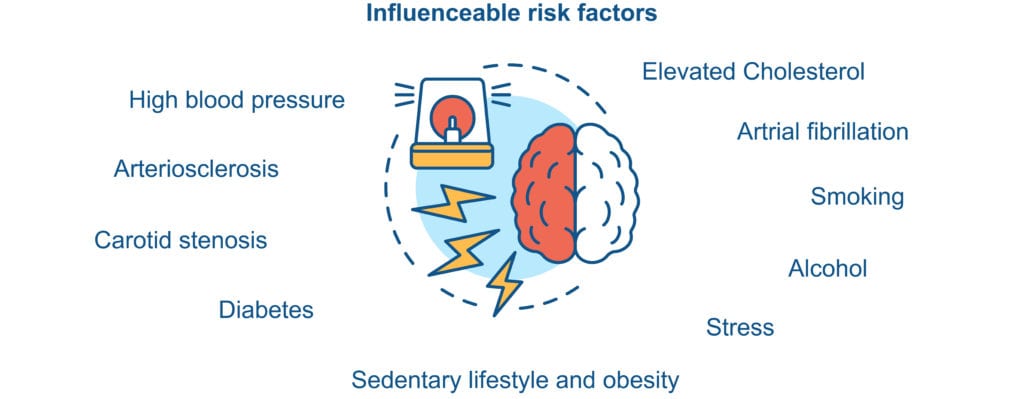
Can I lower my stroke risk?
YES! 90% of all strokes can be prevented if the correlating risk factors are eliminated or reduced!
Change your lifestyle, get treatment for certain diseases or medical problems and regularly go for medical check-ups!
How to prevent a stroke – the earlier you start, the better!

High blood pressure (hypertension)
The higher the blood pressure the higher the risk to be affected by a stroke. Untreated blood pressure leads to deposits on the inner walls of blood vessels (arteriosclerosis).
Regular blood pressure control and good compliance taking prescribed medications are very important!
Arteriosclerosis
Arteriosclerosis occurs when the blood vessels that carry oxygen and nutrients from your heart to the rest of your body (arteries) become thick and stiff — sometimes restricting blood flow to your organs and tissues. In the worst case, the blood flow can be completely interrupted (vascular occlusion).
Narrowing of the carotid artery (Carotid stenosis)
Deposits (Arteriosclerosis) are also the main cause for the narrowing of the carotid artery which can – as a consequence – lead to a stroke
Risk factors like age and gender, smoking, obesity, high cholesterols, diabetes and elevated blood pressure largely influence the emergence of a narrowing and increase the risk of stroke.
Diabetes
Permanently elevated blood sugar levels damage the blood vessels. This leads to the thickening of the vessel walls and the blood flow will be impaired. An existing arteriosclerosis can be worsened as a consequence of diabetes.
The stroke risk is 2 to 3 times higher in diabetic patients.
Sedentary lifestyle and obesity
Sedentary lifestyle and obesity favor – besides several other diseases – also the development of hypertension and diabetes which increase the stroke risk.
Watch your weight and exercise regularly. Physical exercise not only helps your body but also has positive effects on your mental health.
Atrial Fibrillation
Atrial fibrillation is an irregular and often rapid heart rate that can increase your risk of strokes, heart failure and other heart-related complications. A major concern with atrial fibrillation is the potential to develop blood clots within the upper chambers of the heart. These blood clots forming in the heart may circulate to the brain and might cause ischemia and stroke as a consequence.
Smoking
Smoking increases the probability of a thrombosis and elevates the stroke risk which is twice or thrice as high as in non-smokers. The risk is especially high for female smokers using hormonal contraception methods.
Stop smoking or at least limit cigarette consumption drastically. Die health insurance in Austria offers smoking advice here.
Alcohol consumption
Not only risk factors like hypertension, diabetes or smoking but also alcohol consumption plays an important role for the emergence of a stroke. Persons drinking alcoholic beverages regularly and in large amounts have a much higher stroke risk.
Longterm alcohol consumption leads to dependency and is bad for health. Therefore reduce your alcohol consumption.
Elevated Cholesterol
When blood fat levels like cholesterol- and/or triglyceride are higher than they should be the risks to develop arteriosclerosis increase. These blood fats are part of the deposits on the vessel walls. Healthy nutrition, physical exercise and smoking cessation and reduction of alcohol consumption will reduce blood fat levels.
Stress
Stress is a very individual experience which manifests differently from person to person. Fact is that stress has a negative influence on our health. Consequences caused by stress could be:
Elevated blood pressure and blood sugar levels, a narrowing of blood vessels, an tendency for blood clot formation, increased heart rate, stress hormone production. Consequentially all these factors can contribute to an elevated stroke risk.
Remaining risk
There are several risk factors for stroke which cannot be influenced like a genetic predisposition. Also increasing age is an important risk factor for stroke.
In about 20% – 30% of stroke patients the origin of the stroke remains unknown. Medical experts call them cryptogenic strokes.
Sources
- world-stroke.org (View: 15.03.2021)
- schlaganfall-hilfe.de (View: 2.11.2020)
- gesundheit.gv.at (View: 2.11.2020)
- netdoktor.de (View: 2.11.2020)
- netdoktor.de/krankheiten/schlaganfall (Viewf: 2.11.2020)
- schlaganfall-hilfe.de (View: 2.11.2020)
- pflege.de (View: 2.11.2020)
- netdoktor.de/krankheiten/arteriosklerose (View: 30.11.2020).
- netdoktor.de/krankheiten/carotisstenose (View: 30.11.2020).
- netdoktor.de/krankheiten/schlaganfall (View: 07.12.2020)
